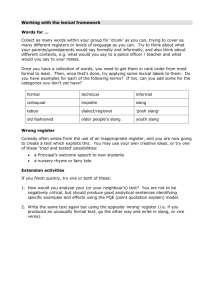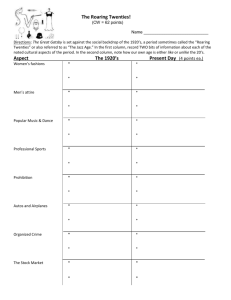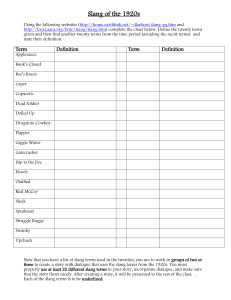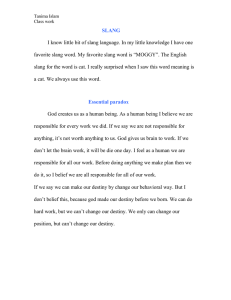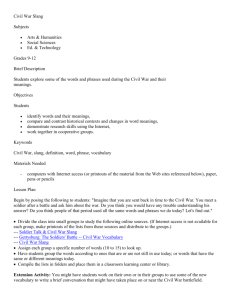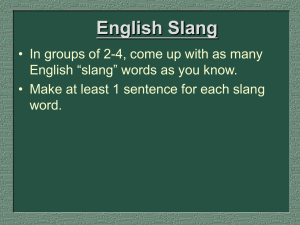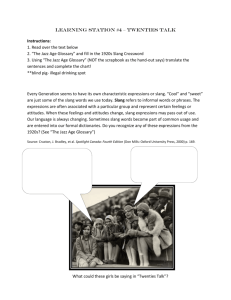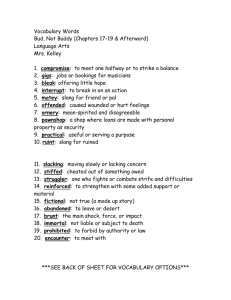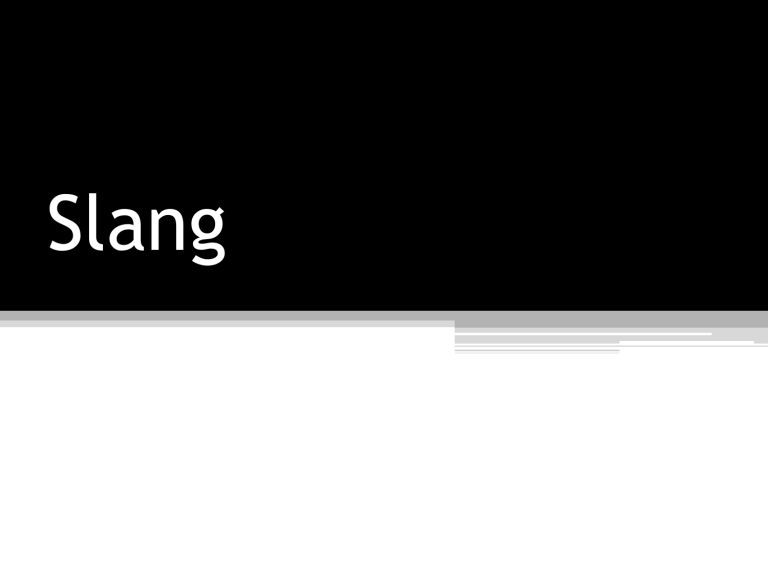
Slang Slang • What is slang? • Where does slang come from? • Why do people use slang? A formal definition • • • • • Highly colloquial; for speaking Rude; not polite Not educated Words used in some special sense Special words of a profession Two less formal definitions • Slang is the poetry of everyday life (S. I. Hayakawa) • Slang is language which takes off its coat, spits on its hands and goes to work (Carl Sandburg) Characteristics of slang • • • • • Colloquial Not standard Restricted Imaginative Variable Colloquial • Slang is almost always spoken o When it is written, it is used to convey the flavor of spoken language o For example, dialogues in novels Not standard • Informal • Often not acceptable in formal situations Restricted • Small groups of people, e.g., college students • Subcultures, e.g., drug culture • People in one profession, e.g., police Imaginative • Language that is alive! o Colorful o Creative Variable in 3 ways: By region • American vs. Australian slang o Breeder in San Francisco o Bouncing beef in Sydney Variable: Gender • In Australia • Males use mate, dude or bro to describe other male friends • Females use babe or bud to describe other female friends • Swearing • For males using the F word is acceptable in more situations than for females Variable: Time • Most slang disappears quickly o Groovy (1960s) o Main squeeze (1950s) Variable: Time • One generation’s slang becomes the next generation’s standard language o Bus from omnibus o Zoo from zoological garden o Piano from pianoforte o Jazz Variable: Time • Some exceptions to slang that quickly disappears o Pig (policeman) is from 1885 and is still slang o Beat it was used by Shakespeare and is still considered slang Where does slang come from? • Originates from subcultures in societies o For example, occupational groups, teenagers, racial minorities, drug addicts, criminals Slang from subcultures • Pre-stiff = a patient who is close to dying ▫ (from U.S. hospital slang) • Homey = friend or buddy ▫ (American black slang) • Pot = marijuana ▫ (1960s drug culture) • C-note = $100 ▫ (criminal slang) Where does slang come from? • Mass media ▫ ▫ ▫ ▫ Movies TV Fashion music Slang from the media • A bomb = a really bad movie • Bucket list = things you want to do before you die ▫ (from The Bucket List with Jack Nicholson) • 5 – 0 = police ▫ (American TV show Hawaii 5-0 in the 1970s) • Top = the ultimate or best ▫ (French slang from the term top models, e.g., Claudia Schiffer, Cindy Crawford, etc. • Cabbage = money ▫ (San Francisco hip-hop slang) Slang is created by playing with words • Rhyming o Trouble and strife = wife o (Cockney rhyming slang) • Making words shorter o Brill = brilliant o (Glasgow, Scotland and parts of the U.S.) o Fab = fabulous o (American 60’s slang; the Fab 4 = the Beatles) Slang is created by playing with words • Borrowing words from other languages o Cushy = comfortable o (From the Hindi Khush; no longer slang) o Yadda yadda = and so on o (from Yiddish and made popular by the sitcom Seinfeld) • Giving words the opposite meaning o Bad = good o (U.S. college slang in the 1990s) o Sick = good o (skateboarding slang) Slang is created by playing with words (3) • Changing the spelling of words o Phat = cool, very good o (U.S. college slang in the 1990s) • Being imaginative with words o Taxed = mugged or robbed o (Honolulu slang) o Gimme some skin = let’s shake o (American 60’s slang) Why do people use slang • To play with language o For the fun of it o To be different o To be creative o To be shocking • Especially musicians, poets, writers, screenwriters, etc. Why do people use slang (2) • To identify with a group o To exclude others o To be secretive • Especially lower classes, groups that are outside the main society, subcultures, etc. Resource for Slang • Urban Dictionary o http://www.urbandictionary.com/
